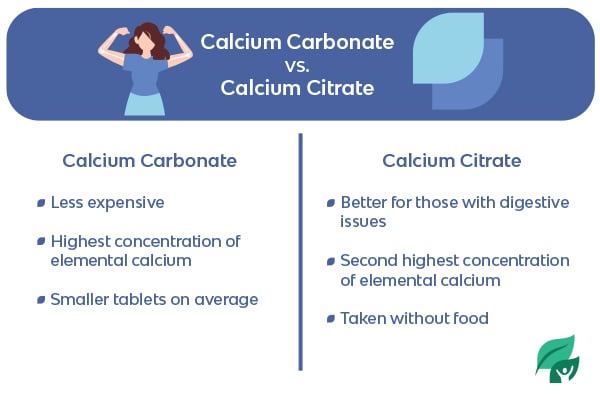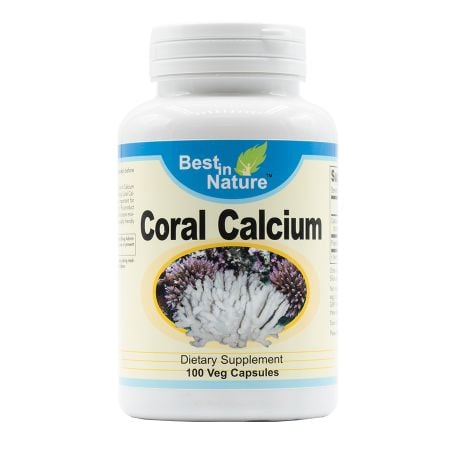
Reviewed and Updated: May 27th, 2025
From the time we’re kids, we’ve heard day in and day out about the importance of calcium. Fortified foods and supplements are everywhere. But you might be wondering when they mention calcium carbonate or calcium citrate whether one is better than the other. Let’s take a look at what calcium is, how much we need, and a few differences between these two forms.
What is Calcium?
Calcium is a type of mineral the body needs to carry out many of its functions and is mainly found in our bones and teeth where it supports their structure and integrity. It can be found naturally in a variety of foods that we eat.
[Related: Digestive Enzymes vs. Probiotics: What You Need to Know]
Why Does the Body Need Calcium?
Humans need calcium for a wide variety of reasons, including muscle control, allowing the nerves to send messages, and helping blood vessels move blood throughout the body. Calcium also helps release different critical hormones and enzymes and supports bone and teeth health.
Should I Take a Calcium Supplement?
According to Johns Hopkins Medicine, it’s generally best to get your calcium by way of the foods you eat such as almonds, soybeans, leafy green veggies, and low-fat dairy products rather than relying solely on calcium supplements. However, calcium supplements can help fill in the gaps for those who cannot get enough calcium naturally from their diets.
Those who are vegan, lactose intolerant, have other digestive issues, consume large amounts of sodium and protein, or receive long-term treatment with corticosteroids may see benefits from taking supplemental calcium. If you feel you need supplemental calcium, you may want to talk to your doctor to see if it’s right for you.
Calcium Requirements by Age
The amount of calcium your body needs primarily depends on both a person’s age and biological sex.
Calcium Requirements For Men
19-70 years of age (YOA): 1,000 mg
71 YOA and older: 1,200 mg
Calcium Requirements for Women
19-50 YOA: 1,000 mg
51 YOA and older: 1,200 mg
How Much Calcium Should You Take at Once?
The Mayo Clinic states that calcium is best absorbed when taken in smaller doses of approximately 600 mg or less at a single time. They further advise that if you take 1,000mg a day, try splitting it up and taking 500 mg at the beginning of the day and 500 mg at night. The reason being that the body cannot absorb more than 500-600 mg of calcium at a time so any dosages larger than that are just inefficient.
Pair with Vitamin D
The human body needs vitamin D to be able to absorb calcium properly, so calcium supplements are best taken alongside vitamin D supplements or Vitamin D-rich/fortified foods. Weather permitting, and depending on your complexion and other health conditions, your body can synthesize enough Vitamin D from 15 minutes of sun exposure. Did you know? Only 10-30 minutes of sun exposure around noon can help your body produce 10,000 - 20,000 IU (International Units) of vitamin D which is a lot more than what foods or daily supplements can provide.
Calcium Citrate vs. Calcium Carbonate: What form of Calcium is Right for You?

The Benefits of Calcium Carbonate
- Calcium carbonate supplements tend to be less expensive.
- Calcium carbonate has the highest concentration of elemental calcium at 40% by weight.
- Calcium carbonate supplements tend to come in smaller tablets on average, so fewer are needed to meet your recommended daily intake.
The Downsides of Calcium Carbonate
- Calcium carbonate shouldn't be taken on an empty stomach.
- Calcium carbonate should be avoided by those with low levels of stomach acid.
- Less absorbable by the body than calcium citrate.
- Calcium carbonate can cause bloating, constipation, and other gut issues in some people. Some have tried to put forward a link to the risk of developing kidney stones, but that link is controversial.
[Related: 16 Ways to Build and Maintain Healthy Bones]
Benefits of Calcium Citrate
- Calcium citrate contains the second-highest concentration of elemental calcium at 21% by weight.
- A meta-analysis found that calcium citrate was about 20% more absorbable than calcium carbonate.
- Calcium citrate absorbs into the body well when taken without food and is suitable for people taking antacids.
- Calcium citrate is generally better for people with digestive issues or people who take antacids or proton pump inhibitors (such as omeprazole) and doesn’t typically lead to constipation.
Downsides of Calcium Citrate
- Calcium citrate supplements tend to come in bigger tablets, and more may be needed to meet your recommended daily intake than calcium carbonate.
- Calcium citrate supplements can also be more expensive than those made from calcium carbonate.
- Some people have had negative reactions as well.
How to Take Calcium Supplements

When it comes to taking calcium supplements, there are four distinct factors that people should keep in mind: time, meals, vitamin D, and dosage.
Timing & Dosage
Since it’s easier for the body to absorb smaller amounts of calcium, it’s generally best to only take no more than 600 mg at a single time. One 500 mg supplement can be taken in the morning and another at night for the best potential absorption into the body. That should provide adults with the recommended daily dose of 1,000 mg of calcium per day.
Meals
Many types of calcium supplements, especially calcium carbonate, should be taken with food. It’s best to take them after completing your breakfast and dinner respectively. On the other hand, calcium citrate should be taken on an empty stomach before eating.
Vitamin D
As previously stated, vitamin D is critical to the body’s overall ability to absorb calcium successfully and use it effectively. As a result, it’s generally best to take calcium supplements with enough vitamin D.
Vitamin D Requirements by Age
Take a look at the daily RDA (Recommended Dietary Allowance) of Vitamin D based on sex and age.
[Related: Dietary Dangers: Foods to Avoid for Osteoporosis]
Vitamin D Requirements For Men and Women
19-70 years of age (YOA): 15 mcg or 600 IU
71 YOA and older: 20 mcg or 800 IU
Which Calcium Supplement is Right for You?
Some positives and negatives come with each form of calcium. Consider reaching out to your doctor to get their opinion if it could be right for you and if so which form is more beneficial.

Other FAQs about Calcium Supplements
Before purchasing either calcium carbonate or calcium citrate supplements, there are a few other questions and factors that people should know about.
Do calcium supplements really contain heavy metals?
Some low-quality calcium supplements have been shown to contain potentially dangerous levels of lead that should be avoided, particularly if the supplements are made from bone meal, dolomite, or oyster shells. On the other hand, chelated calcium citrate is a safe alternative free of heavy metal contamination.
What type of calcium supplement can lower my risk of kidney stones?
Those who experience kidney stones or are at risk of experiencing them may have calcium citrate recommended by their doctors to help them excrete more urinary citrate. This excretion can help protect against the formation of potential kidney stones.
Bottom Line
When it comes to Calcium Carbonate vs Calcium Citrate, they each have their own pros and cons so neither is a clear winner. As with many other things in health, it’s going to be an individual case of what works best for you and your needs.
* This article is for informational purposes only and doesn’t constitute medical advice. For immediate health concerns, please consult your physician.
These statements have not been evaluated by the Food and Drug Administration. Products are not intended to diagnose, treat, cure or prevent disease.
© 2025 Best in Nature All rights reserved








Validate your login
Sign In
Create New Account